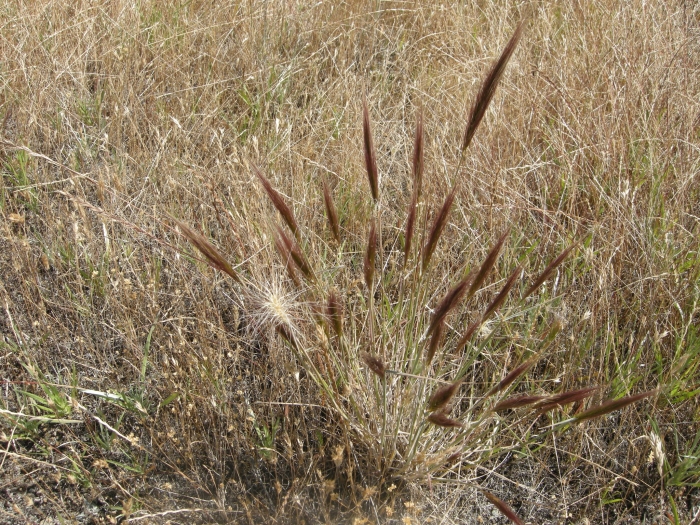Big Squirreltail
(Elymus multisetus)
Big Squirreltail (Elymus multisetus)
/
/

© Bob Dodge
CC BY 4.0
Image By:
© Bob Dodge
Recorded By:
Copyright:
CC BY 4.0
Copyright Notice:
Photo by: © Bob Dodge | License Type: CC BY 4.0 | License URL: http://creativecommons.org/licenses/by/4.0/ | Uploader: bob-dodge | Publisher: iNaturalist |
























Estimated Native Range
Summary
Elymus multisetus, commonly known as big squirreltail, is a perennial grass native to the Great Basin and surrounding areas of the western United States, including sagebrush deserts, dry meadows, and open woodlands. It typically grows up to 24 inches tall and is characterized by its distinctive inflorescence, which bears spikelets with long, hairlike awns that can reach up to 8 inches in length, giving the plant a bushy appearance reminiscent of a squirrel’s tail. The flowering season occurs from late spring to early summer, and the flowers are not particularly showy, but they do add a fine-textured element to the landscape.
Big squirreltail is valued for its ability to thrive in arid conditions and its utility in erosion control due to its extensive root system. It is often used in restoration projects, xeriscaping, and as a fire-resistant plant in fire-prone areas. This grass is adaptable to a range of soil types, from sandy to clay, as long as they are well-drained. It requires minimal water once established, making it an excellent choice for low-maintenance naturalistic plantings. While it prefers full sun, it can tolerate partial shade. There are no significant disease or pest problems associated with Elymus multisetus, but it can become weedy if not managed properly.CC BY-SA 4.0
Big squirreltail is valued for its ability to thrive in arid conditions and its utility in erosion control due to its extensive root system. It is often used in restoration projects, xeriscaping, and as a fire-resistant plant in fire-prone areas. This grass is adaptable to a range of soil types, from sandy to clay, as long as they are well-drained. It requires minimal water once established, making it an excellent choice for low-maintenance naturalistic plantings. While it prefers full sun, it can tolerate partial shade. There are no significant disease or pest problems associated with Elymus multisetus, but it can become weedy if not managed properly.CC BY-SA 4.0
Plant Description
- Plant Type: Grass
- Height: 1-2 feet
- Width: 1-3 feet
- Growth Rate: Moderate
- Flower Color: N/A
- Flowering Season: Spring, Summer
- Leaf Retention: Deciduous
Growth Requirements
- Sun: Full Sun, Part Shade
- Water: Medium
- Drainage: Medium, Fast
Common Uses
Bank Stabilization, Erosion Control, Fire Resistant, Low Maintenance
Natural Habitat
native to the Great Basin and surrounding areas of the western United States, including sagebrush deserts, dry meadows, and open woodlands
Other Names
Common Names: Big Squirreltail Grass
Scientific Names: , Elymus multisetus, Elymus multisetus, Elymus sitanion var. jubatum, Elymus sitanion var. jubatum, Sitanion breviaristatum, Sitanion jubatum, Sitanion multisetum, Sitanion polyantherix, Sitanion strictum
GBIF Accepted Name: